 Petzlover
Petzlover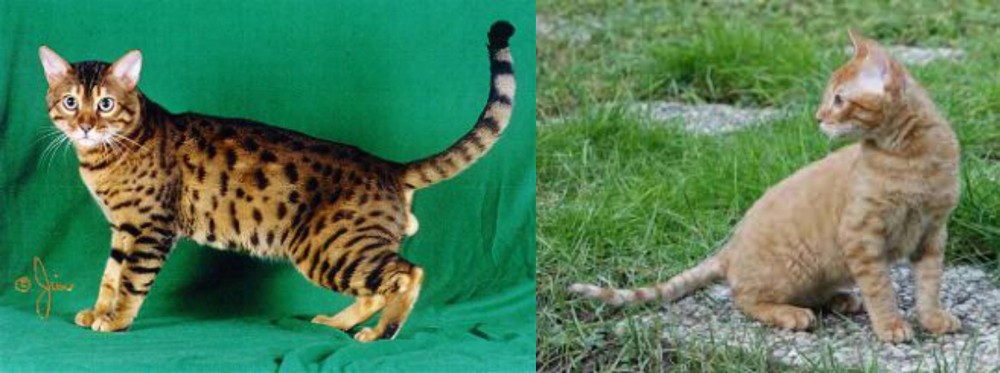 Bristol is originated from United States but German Rex is originated from Germany. Both Bristol and German Rex are having almost same weight. Bristol may live 3 years more than German Rex. Both Bristol and German Rex has same litter size. Both Bristol and German Rex requires Low Maintenance.
Bristol is originated from United States but German Rex is originated from Germany. Both Bristol and German Rex are having almost same weight. Bristol may live 3 years more than German Rex. Both Bristol and German Rex has same litter size. Both Bristol and German Rex requires Low Maintenance.
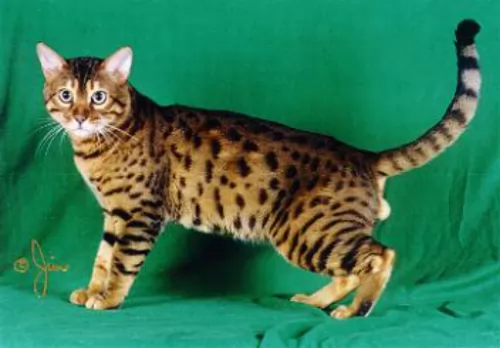 The Bristol cat hails from Texas and was developed during the 1980s, using a south American wild cat and domestic cats.
The Bristol cat hails from Texas and was developed during the 1980s, using a south American wild cat and domestic cats.
The Bristol cat isn’t well-known and in fact, its origins are shrouded in mystery.
The cat was recognized and admitted into the TICA (The International Cat Association. It is looked upon as a hybrid breed or a designer cat.
Nobody seems to know when the first Bristol cat was even bred. Because of its exotic nature, it is believed to be a cross between the American Shorthair and the margay or similar breed.
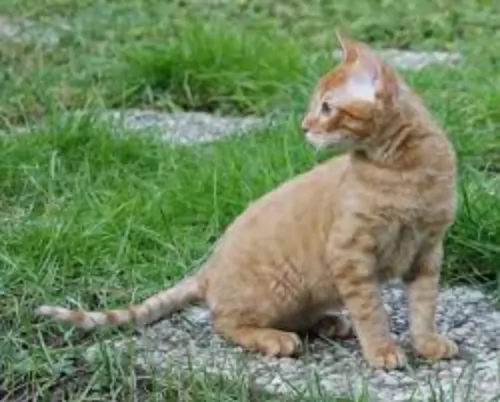 The cat originates from Germany and was developed in about the 1950s. Dr. Rose Scheuer-Karpin found a frizzy-haired black and white cat and chose to breed her.
The cat originates from Germany and was developed in about the 1950s. Dr. Rose Scheuer-Karpin found a frizzy-haired black and white cat and chose to breed her.
So as to fix the frizzy hair gene, it was decided to mate the cat further and this was the start of the German Rex.
It was later crossed with the Cornish Rex. The cats were recognized by the International Feline Foundation, but the Cat Fanciers' Association still associates the breed with the Cornish Rex.
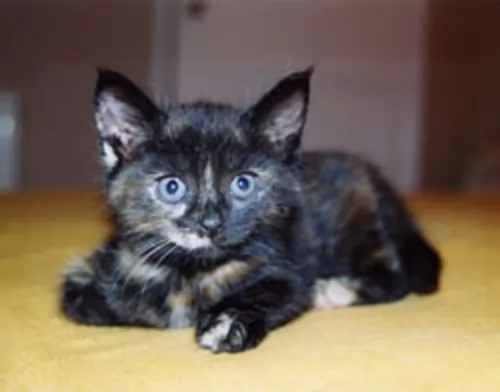 Bristol cats are medium-sized and muscular, powerful cats. They are much like Bengal cats. They have a smokey charcoal appearance while others have quite a bit of white on them.
Bristol cats are medium-sized and muscular, powerful cats. They are much like Bengal cats. They have a smokey charcoal appearance while others have quite a bit of white on them.
They also have rosettes and small rounded ears. The origins of the Bristol breed are uncertain but it seems a multi-colored cat was adopted by a United States Army captain in Australia.
The cat was so adored it was brought back when they returned to the United States. The cat was already pregnant and she gave birth to 2 kittens. The coats are shiny and short-haired with spots and lines of fawn, grey and brown mostly with the eyes being green.
The Bristol cat has a very pleasing disposition – being amicable, playful, and loving. They’re intelligent cats too but they need to spend time in solitude as well.
They definitely don’t respond and bond to everyone in the human family but tend to respond to only one person.
These Bristol cats are cunning and self-confident and because of their wild side, they will need a large area to roam. This is definitely not a cat for city life.
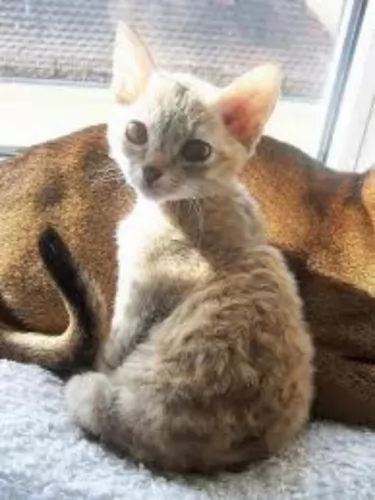 This is a medium-sized, muscular domestic cat with a well-developed chest. The cat can weigh between 3 and 6kg.
This is a medium-sized, muscular domestic cat with a well-developed chest. The cat can weigh between 3 and 6kg.
The legs are fairly long and slender but strong and the tail is thick and furry with a rounded tip. The head is round and the ears are large. The eye colors are always related to the coat color. The coat is short and silky and in many colors and it has a tendency to curl.
These are friendly cats that form a strong bond with their human owners, although they are friendly towards strangers too.
They’re intelligent, lively, and playful too and will fit in well to homes with children.
Because of their playful nature, you want to ensure you provide them with lots of entertaining, stimulating toys.
They’ve got balanced personalities and are known for being sociable, adapting to the lifestyles they find themselves in. They will also get on well with other pets in the home, and enjoy being both indoors and outside.
 The Bristol cat is beautiful all right, but once again humans should just leave wild cats alone in the bush.
The Bristol cat is beautiful all right, but once again humans should just leave wild cats alone in the bush.
Mixing them with domestic cats doesn’t work in the long run, and many of these cats land up in shelters because of unruly behavior. The Bristol cat is part wild and it doesn’t seem to have a future although there isn’ enough information online to really know what its future is.
 Your German Rex is everything you want in a pet. He is a cat that loves his human family and is prepared to offer loyalty and love in exchange for the same.
Your German Rex is everything you want in a pet. He is a cat that loves his human family and is prepared to offer loyalty and love in exchange for the same.
He is adaptable and undemanding. Before you invest in such a cat, understand that interaction from you is highly important, so if you don’t have time for an adult pet, it would be kinder not to get this particular cat breed as they crave lots of attention,
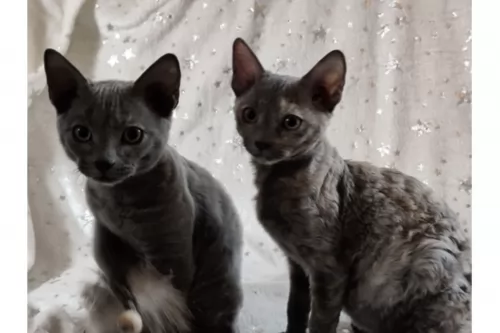 With excellent care and lots of love and attention, your German Rex can reach up to 17 years of age. They aren’t prone to any particular diseases, but diet plays a massive role in their health.
With excellent care and lots of love and attention, your German Rex can reach up to 17 years of age. They aren’t prone to any particular diseases, but diet plays a massive role in their health.
Remember that obesity is a major disease and it in itself can contribute to a host of other illnesses in cats and shorten its life. Excess weight contributes towards arthritis and diabetes and just losing a bit of weight can contribute towards increased mobility.
Dental disease is a common, chronic problem and you need to ensure your pet’s diet promotes dental health. It can be extremely stressful for your cat to have his teeth brushed, but in the case of chronic dental infection, get your pet to a vet.
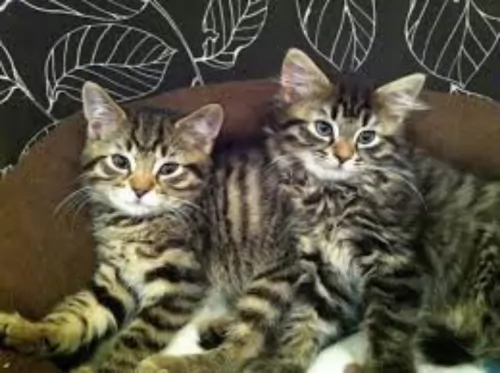 The diet of a cat such as the Bristol will include small rodents, however once domesticated, these cats will need a diet high in protein. The cat is a carnivore and to be healthy it will require high-quality premium commercial cat food that is appropriate for the age of your cat and his health status.
The diet of a cat such as the Bristol will include small rodents, however once domesticated, these cats will need a diet high in protein. The cat is a carnivore and to be healthy it will require high-quality premium commercial cat food that is appropriate for the age of your cat and his health status.
The best cat food has taurine in it, an essential protein that cats can only obtain through quality food. Your adult Bristol cat may prefer eating several smaller meals and this is actually a good idea as smaller frequent meals help towards greater urinary tract health.
If you want a healthy cat, you have to be diligent with providing such a cat with good food that is high in protein. If you aren’t sure, your veterinarian will be able to advise you on what to feed your new cat or kitten.
Factors such as age, size, activity levels, and health make a difference to what you feed your cat, how much and how frequently.
Get into a habit of reading and understanding the labels on the cat food packaging. Certainly, every cat requires taurine, an essential amino acid. You will also need to ensure fresh, cool water day and night.
Always take your pet to the veterinarian if he is lethargic ad disinterested in his food.
Most cats are clean, but you should brush or comb your Bristol cat regularly as the brushing helps keep your cat's coat shiny and also reduces the amount of hair during shedding.
Provide your Bristol cat with a dry, warm sleeping area and keep the bedding clean.
Your Bristol cat needs to wear a safety collar and an ID tag. These ID tags or an implanted microchip can help ensure that your Bristol cat is returned if he becomes lost.
Cats scratch, and cutting your cat’s nails will keep the nails blunt. Nonetheless, to prevent your furniture from being scratched, provide your cat with a strong scratching post covered with a rough material such as sisal or tree bark.
Bristol cats are independent and they don’t require any kind of special care. Certainly, they require large areas for their active lifestyle as well as a shallow pool for swimming.
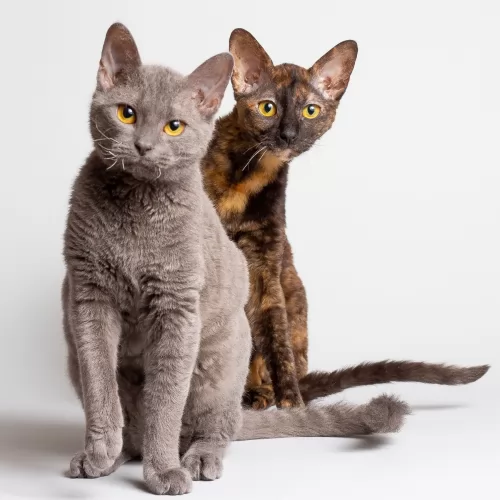 The German Rex is a shorthaired breed so a gentle brush once a week will be quite adequate.
The German Rex is a shorthaired breed so a gentle brush once a week will be quite adequate.
As you groom your German Rex, feel for any unusual lumps and make sure there are no signs of sores or rashes on your cat.
Check inside his ears for wax and dirt buildup and signs of redness for infection. If you don’t like to clean the inside of your cat’s ears, there are professional cat groomers and your local vet who will do this for you.
Make sure you feed your Rex the best cat food there is. When you look at the commercially cat manufactured foods there are, you’ll notice that there is dry kibble for cats as well as wet-type foods.
Through trial and error, you’ll learn what your cat likes, but your vet can offer valuable information on what is essential in a cat’s diet. Cats are carnivores so that means their diets have to be high in meat – protein – and low in carbohydrates.
Check out the best cat foods there are – the ones that have all the vitamins and minerals your cat requires to remain healthy.
Provide your cat with a litter box and keep it meticulously clean, scooping out the cat droppings every day and changing the actual sand or grit regularly.
Provide your cat with a warm bed, food and water bowls, toys, collar, and tag, climbing tree and scratching post.
Your kitten must start their first vaccines between 8 and 12 weeks of age. Your kitten will also be dewormed.
Take your cat to the vet when he is sick.